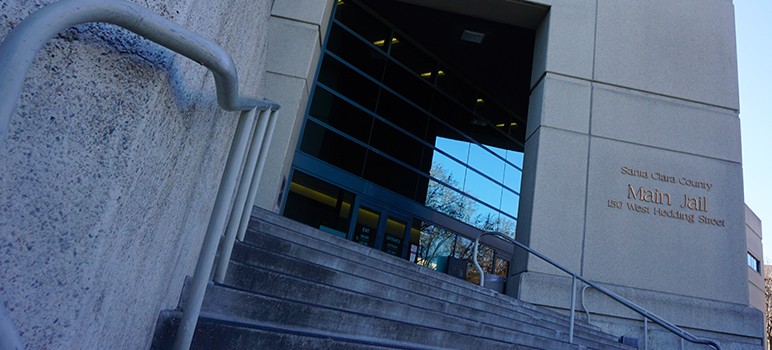Diabetic nerve damage in David Cole’s feet relegated him to a wheelchair during his stay through 2016 at Santa Clara County’s Elmwood Correctional Facility. But he said the jail’s failure to accommodate his disability left him at the mercy of other inmates.
Four times a day, Cole would rely on a fellow prisoner to wheel him over high curbs, up steep ramps and through heavy steel doors to the “pill call” area for his insulin shots. Inaccessible facilities and transportation meant he couldn’t participate in drug counseling and sometimes had to skip medical appointments.
Leroy Benjamin, who suffers from chronic pain and partial paralysis, said he struggled to get around at the San Jose Main Jail because staff didn’t promptly give him with a cane. Same went for inmate Erasmo Flores Jr. Robert Phillips, whose foot drags when he walks, said had no way to get around either, and that once, while shackled at the ankles, he fell down the stairs. At times, limited access at the aging jails impacted the criminal cases of disabled inmates. Paralyzed-from-the-waist-down Brandon Williams said he was rushed to Valley Medical Center after his improperly-fastened wheelchair flipped over in a van taking him to one of his court hearing.
The five men, who in 2016 volunteered as lead plaintiffs in a class-action lawsuit against the county, reached a tentative settlement this week that calls for upgrading the jails and revising policies to ensure that mobility impaired inmates have access to necessary services, facilities and equipment.
Under a 56-page remedial plan pending approval from a federal judge, the Santa Clara County Sheriff’s Office Department of Correction must establish a dedicated Americans with Disabilities Act unit, staffed with a full-time coordinator, at an annual cost of $1.1 million and buy a $283,000 electronic tracking system to monitor disability access. It must also pay San Francisco-based Rosen Bien Galvan & Grunfield, the law firm representing the inmates, $3.2 million in attorneys’ fees and other legal costs.
This marks the second federal consent decree imposed on the county jail system—the fifth largest in California—since last month. On Oct. 23, the county resolved a lawsuit brought by the nonprofit Prison Law Office alleging inhumane treatment of prisoners, substandard medical care and over-use of solitary confinement. The county agreed to pay the public-interest law firm $1.6 million in legal fees as well as $200,000 a year for monitoring to make sure the jails implement the terms of the decree, which was far broader in scope than the case that culminated in a settlement this week.
“They’ve been sort of parallel lawsuits from the start,” explained Lisa Ells, a partner with Rosen Bien Galvan & Grunfield. “They don’t overlap. Our consent decree is specifically about mobility-impaired inmates and architectural problems that impeded their access to facilities and programs.”
The Prison Law Office case, by comparison, touched on a wider range of disabilities, including mental health and vision, and addressed out-of-cell time, use-of-force and solitary confinement. Ells said the county negotiated the two consent decrees so that they complemented one another.
“We credit the county for their collaboration,” Ells said in a phone call Wednesday. “One of the positive things was that from the start, the county wanted to resolve these problems. So we worked very hard to agree on what the scope and remedy would be.”
As part of the latest settlement, the county has agreed to change its booking process to better assess inmates who have trouble getting around, to promptly issue mobility devices for those who need them, to make sure they’re housed in legally compliant facilities. The Sheriff’s Office also agreed to hire a full-time coordinator to make sure that the jails comply with those standards. In addition, it will train custody and jail medical staff about how to accommodate mobility-restricted inmates and will improve the way it processes disability-access-related grievances.
The additional monitoring called for by the two consent decrees comes as the county is trying to establish a civilian oversight office to keep an eye on the embattled jails. Independent civilian oversight was one of scores of recommendations handed down by a citizen task force convened in the wake of the 2015 killing of mentally ill inmate Michael Tyree, which led to murder convictions for three jail deputies and spurred sweeping reforms that remain underway.
In a statement sent to reporters Wednesday morning, County Counsel James Williams said the county welcomes the settlement, noting that it has already allocated upward of $100 million to help upgrade the jails so they comply with federal disability-access laws.
Sheriff Laurie Smith, who recent won a sixth term as top cop, said in a news release that she takes the obligations laid out in the latest settlement seriously and that she has already instituted many of the prescribed changes. For years, she added, the Sheriff’s Office has been planning a new Main Jail in San Jose that will offer far better accessibility than the aging complex off of Hedding Street.





> at an annual cost of $1.1 million and buy a $283,000 electronic tracking system to monitor disability access. It must also pay San Francisco-based Rosen Bien Galvan & Grunfield, the law firm representing the inmates, $3.2 million in attorneys’ fees and other legal costs.
“Daring daylight heist nets crime gang $4.6 million”
“Witnesses say perps were wearing ‘nice suits’, appeared calm during theft”.
“Most bystanders didn’t even know there was a robbery going on. ‘They were real pros’, said another witness.”
The lawsuit was filed in 2016. This consent decree was signed 11/12/18, 6 days after the election. I am pretty sure the settlement was prepped and agreed for a while and just put on ice until after the election. You will never find out because they hide behind attorney-client privilege for PRA requests. This is the kind of dirty and non-transparent stuff that makes you lose faith.